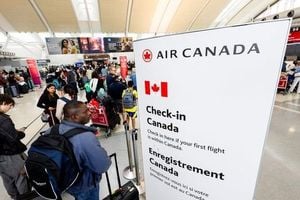An EasyJet pilot has been suspended after flying too close to a mountain during a flight from Manchester to Egypt, landing the aircraft filled with 190 passengers and crew members dangerously close to disaster. The incident occurred when the Airbus A320 was approaching Hurghada Airport; the Ground Proximity Warning System (GPWS) triggered, signaling to the pilot the impending danger as the aircraft descended.
On the day of the incident, February 2025, the plane was reportedly descending at 4,928 feet per minute, which is significantly above the normal rate. The flight was hovering at just 3,100 feet over the mountain range, putting it only 771 feet away from the mountain peak, which stands at 2,329 feet. This narrow escape has raised serious concerns over flight safety and pilot adherence to protocols.
Captain Paul Elsworth, the pilot of the flight, has been grounded following the incident and is currently under investigation. His commanding authority to pilot the aircraft was revoked within moments after receiving the alert from the GPWS, which only activates when the plane is nearing terrain. An EasyJet spokesperson confirmed: “Safety is the number one priority for all our pilots; they are trained to the highest industry standards, subject to rigorous testing and monitored closely.”
The incident occurred just as Captain Elsworth was preparing to land the plane safely. Only at the last moment did he manage to level the aircraft and avoid crashing, but the warning highlighted the urgent need for scrutiny of the circumstances surrounding the flight. Passengers on board were reportedly oblivious to the serious nature of the incident, as no immediate harm came to them.
Following the near-miss, Captain Elsworth reported the situation to EasyJet management the following day. Sources revealed to The Sun the rapid descent and subsequent GPWS alert led officials to step in quickly, pulling Elsworth from any future piloting until inquiries were concluded, adding: “The pilot will be asked detailed questions.”
Safety authorities are currently reviewing EasyJet’s operations following the alarming incident. This situation has sparked discussions among aviation safety experts who often advocate for strict adherence to altitude regulations, especially when approaching areas recognized for difficult landings due to geographical features.
Reports indicate the area’s minimum safe altitude was 6,000 feet, well above the flight’s altitude at the time of the incident. When examining why the aircraft was flying at such low levels, it becomes imperative to analyze both the pilot’s judgment as well as the protocols followed by air traffic control.
EasyJet has emphasized its commitment to safety, yet this event has cast shadows on their operational procedures. While EasyJet states their pilots complete rigorous training, including simulations for emergencies, many wonder whether existing training programs are adequate, especially under challenging circumstances where geographical hazards may not be readily apparent.
There is also scrutiny surrounding the pilot's background, as Captain Paul Elsworth had previously reported on his son, Luke Elsworth, who rose to fame as the youngest airline pilot in the UK at age 20. Luke established his career with EasyJet shortly after receiving his license, which sparked conversations about generational responsibilities within aviation. With regard to the current investigation, questions arise about how individuals with familial connections to airline operations hold up when such incidents occur.
The Civil Aviation Authority (CAA) is expected to oversee the investigation closely, ensuring both transparency for EasyJet and reassurance for passengers. The overall atmosphere for the airline now hangs on the outcomes of this inquiry as they work to restore public confidence.
With the aviation industry still recovering from the aftermath of the global pandemic, safety concerns are especially heightened. The high number of passengers worldwide depends on the utmost diligence from flying crews to maintain secure flying conditions.
The fact remains: incidents like these threaten the delicate balance of trust established between passengers and airlines. Consumers expect to board flights with the assurance their safety is held above all else, and any indication of neglect, whether through improper altitude monitoring or failure to heed warning systems, has grave consequences for airlines.
Therefore, this unfortunate incident where Captain Elsworth was suspended is more than just another story; it’s a severe reminder of the vigilance required within aviation safety and the importance of strict compliance with regulations.
A thorough investigation is now underway with EasyJet cooperating fully, as safety continues to be the primary concern. For Elsworth and others involved, the hope remains for clarity and resolution, ensuring no similar incidents jeopardize future flights.



